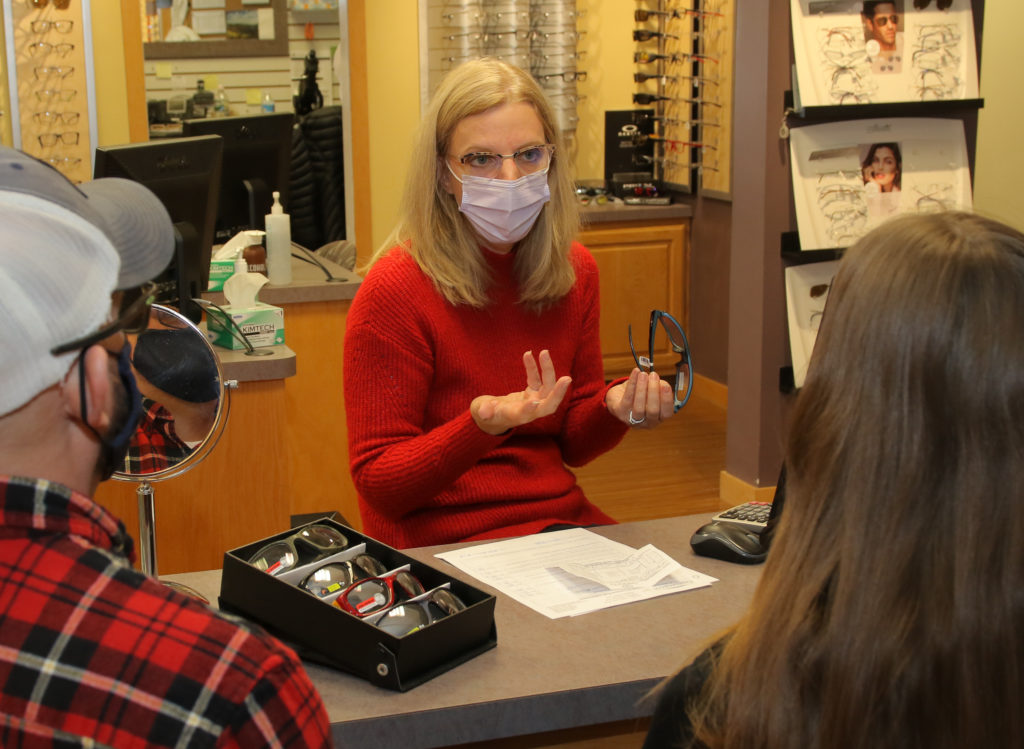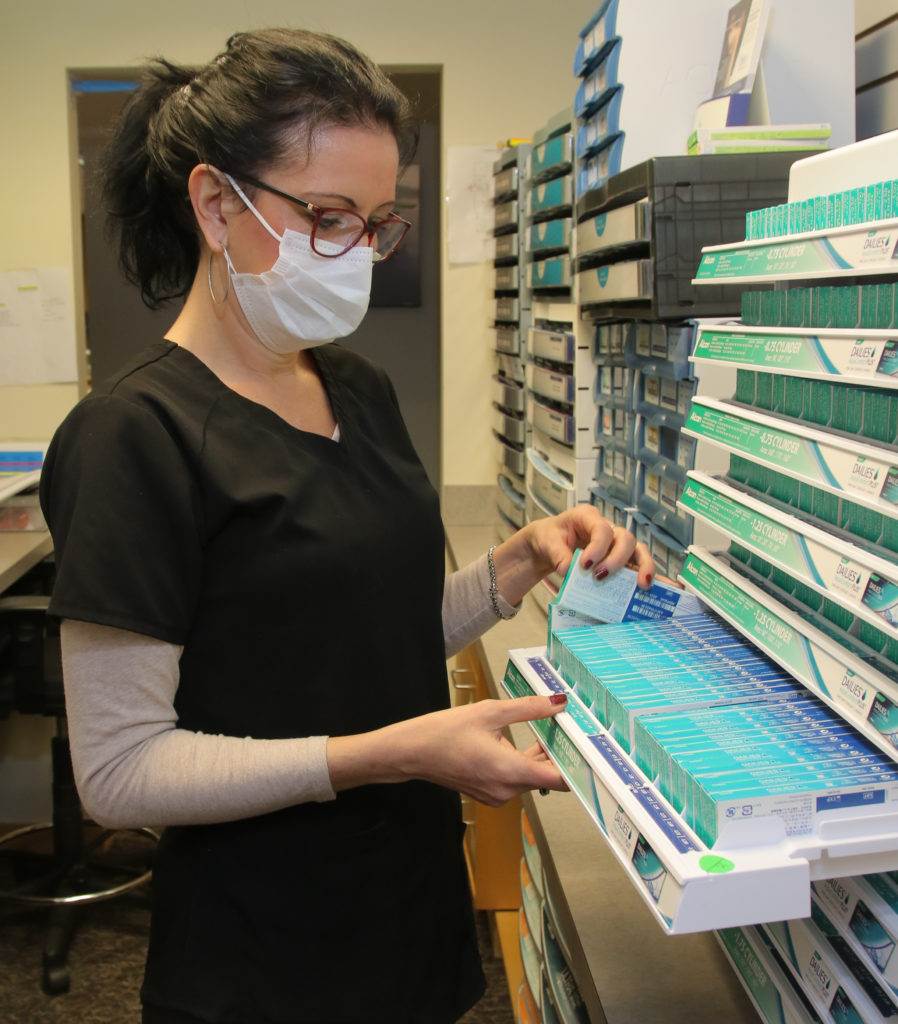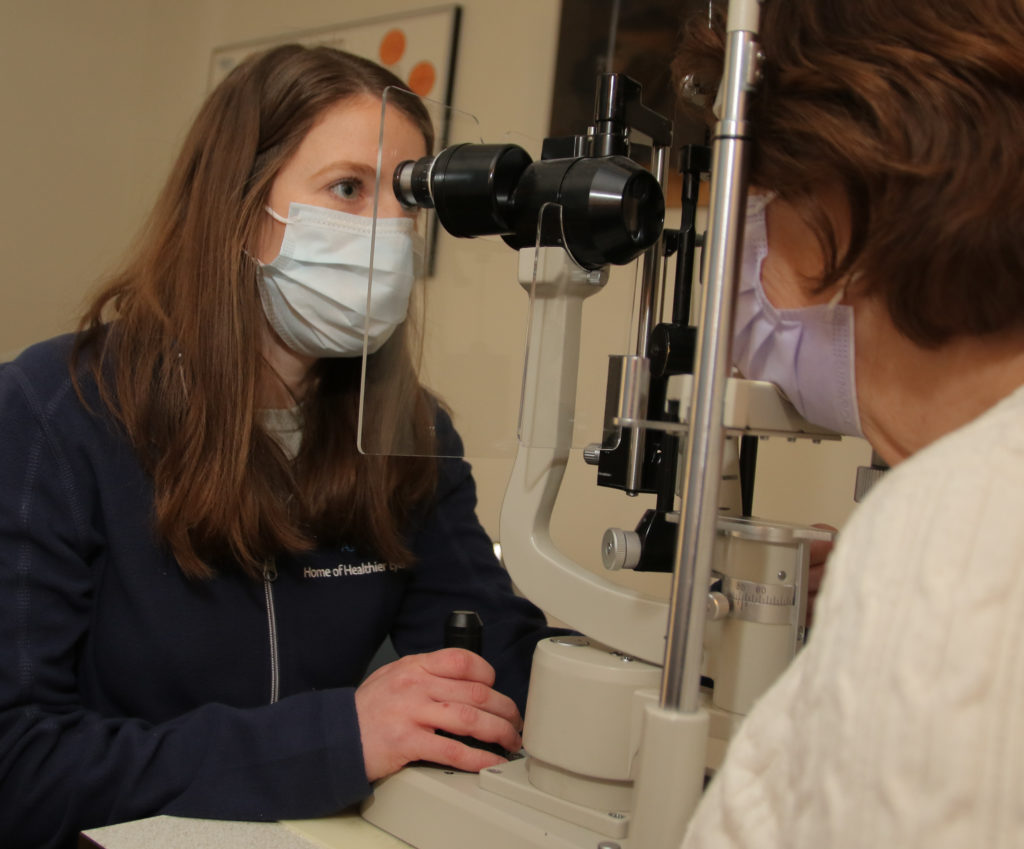Keeping patients safe for eye exams
By Nathan Tsukroff
LEWISTON – Seeing patients means careful screening and social distancing for medical practices under COVID-19 restrictions.
That’s especially true at Optometric Associates on East Avenue in Lewiston.
From the initial screening of all patients and visitors to the practice, through examinations and checkout, doctors and other staff at the practice have created a safe environment for anyone needing help with issues with their eyes.

Optometric Associates is a team of three doctors who treat issues ranging from patients needing glasses to those suffering from glaucoma, problems with the retina (the rear of the eye, where images are formed), dry eye, or needing LASIK comanagement.
Practice management was made all the more difficult with the restrictions imposed under the State of Maine COVID-19 guidelines. Like other businesses in Maine, the practice closed its doors near the end of the March as the state was temporarily shut down at the start of the pandemic.
“During that time I consulted a lot of the guidelines from the (Maine Center for Disease Control) CDC on how to maintain as safe as possible conditions to continue to do eye exams,” Douglas J. Henry, O.D., Ph.D., said.
Henry is the lead doctor for the practice, having joined Drs. George Bournakel and Pauline Beale at the practice in 1999. Both doctors have since retired.
Dr. Stephen Ebersole joined the practice about 14 years ago, and Dr. Abigail Heroth just came on board in August.
Under the pandemic guidelines, “We screen everyone with questions, as well as the temperature screen before they enter. We also do a lot more cleaning. We’re cleaning the rooms thoroughly – cleaning everything the patient touches when they visit. Even the pens they use to sign in are immediately put in a bin to be sterilized.”

The practice has an optical center where patients can purchase glasses, and “When someone tries on glasses, they’re kept aside and then they’re sterilized before they’re put out again,” Henry said. Everything a patient touches during a visit is wiped down with sterilizer.
“My staff is seeing about the same number of patients a day as we did before (the COVID-19 restrictions), but they’re working a lot harder,” he said. Staff members at the practice guide patients on social distancing needs, as well as sterilizing items and rooms throughout the day.
Even in the optical center, which is an open area at the front of the practice, “We’ve maintained social distancing. There’s only so many visitors allowed at a time,” Henry said. And there is “lots of wiping down everything.”
Many of the patients at the practice are older, he said, so these precautions are important for their safety, along with the safety of staff members. “We have staff that are in high-risk groups, that are older, that have physical conditions.”
“It’s even tougher for our employees that are parents, because now they’ve got to deal with possible exposures at their children’s school, and they’ve got to worry about bringing that into the office,” Henry said. “So there’s a lot of guidelines to follow!”
Remote schooling means some staff members with children have not been able to work the same hours as in the past, which adds another layer of complexity to running the practice during the pandemic. Because a staff member might need to stay home, “We don’t always have a full staff,” Henry said. Some parents have had to quarantine with a child who was exposed to a classmate diagnosed with COVID-19.
“We’ve been trying to make work hours more flexible when we can. but we’ve had to deal with a lot of short-staffing issues, like a lot of other businesses, too, especially the healthcare,” he said. That’s another reason staff members “have been working harder, too – to cover for each other.”
The practice was shut down completely for about seven weeks in the spring, then opened back up “at a trickle,” with only five people at a time visiting the building the first month, Henry said. That was a difficult requirement to meet at times, since patients sometimes needed to bring a family member.
“I’m very proud of my staff, and I’m proud to say that patients have sometimes said this is the first public place they’ve been to since self-quarantining, and that they felt safe,” He said. “Or, they’ve said this the first place they’ve actually felt safe in public, because we’re being so careful.”
Patients arriving at the practice can come to the entrance of the building where they are greeted by a staff member and invited into the vestibule for screening. A touchless thermometer is used to read forehead temperatures, and patients are asked about their personal health and any exposure to someone with COVID-19, before being allowed to enter the practice.
The practice has been here in Lewiston about 65 years beginning in the mid-1950’s under Dr. Sam Alpern. Dr. Bournakel joined as an associate of Dr. Alpern, then brought in Dr. Beale about 46 years ago.
The practice built and moved into its current quarters in the mid-1970’s.
Dr. Henry began practicing with an emphasis on contact lenses, glaucoma, ocular disease, and primary care. He is a Phi Beta Kappa graduate of the University of Illinois and earned his Ph.D. in Neurobiology at Wayne State University in Detroit, Michigan. As a neuroscientist, he authored 15 research articles and book chapters, and earned several teaching awards.
Dr. Ebersole graduated from the University of Delaware with a bachelor of arts degree in biology, then earned his doctorate of optometry at Ohio State University. He went on to complete a residency program centered on the diagnosis and management of common ocular diseases. such as glaucoma, cataracts, and macular degeneration. He served on the Maine Optometric Associations Board of Directors where he was instrumental in bringing the InfantSEE® program to Maine. The InfantSEE® program is a public health program developed to provide professional eye care for infants nationwide.
Dr. Heroth, earned her doctorate of optometry from the Pennsylvania College of Optometry, graduating with honors in the spring of 2019. She spent the next year in a post-doctoral residency focused on ocular disease and primary care while working in the Togus VA Medical center in both Augusta and Bangor.. She had previously earned a bachelor of arts in Biotechnology and Molecular Biology at Assumption College in Worcerster, MA.

Dr. Henry sees the practice expanding in the future with the need for eye care in the central Maine area, although he said that “times are uncertain these days” and adding additional doctors will be balanced against the flow of patients allowed under pandemic restrictions.
Optometric Associates provides a unique service for patients with dry eye, a chronic condition in which the body does not produce enough tears, or poor quality tears that don’t sufficiently lubricate the eye.
In addition to providing traditional treatments for dry eye – such as eye drops, prescription medicines, and At-home treatments like a Bruder mask, or lid therapies like Hypochlor and Avenova – the practice provides a treatment called Lipiflow. This treatment provides precise thermal pulsation to the meibomian tear glands to enhance tear quality and ocular discomfort. It combines heat with physical massage to liquefy and express the meibomian gland contents in an effort to return the lipid layer of the ocular surface to normal condition.
The three doctors at the practice are optometrists, eye doctors that can examine, diagnose, and treat eyes. If a patient needs surgery, they will be referred to an ophthalmologist, who is a medical doctor that performs perform medical and surgical interventions for eye conditions.
The practice also has a staff of opticians, who are professionals that help fit eyeglasses, contact lenses, and other vision-correcting devices.


